Sentenced Home
After escaping the long war and the Khmer Rouge genocide, hundreds of Cambodian refugees reached safety in America, only to wind up, decades later, deported to a land many never even knew. Isolated and ill equipped to fit into society, they form a strange sub-culture in one of the world's poorest countries, turned into a human dumping ground in yet another shameful sidebar to America's relentless search for Homeland Security.
By Ron Gluckman /Phnom Penh, Cambodia
BY THE TIME TRIP AND
YOUNGSTER broke into the dingy
flat in Phnom Penh, seeking missing pal Ver Chan, the smell of misery in his
apartment had thickened into decay. A full day, maybe two, had passed since
Chan, 34, from California, scribbled a note to his family, knotted a rope around
his neck, and ended his terse, tormented stay in Cambodia.
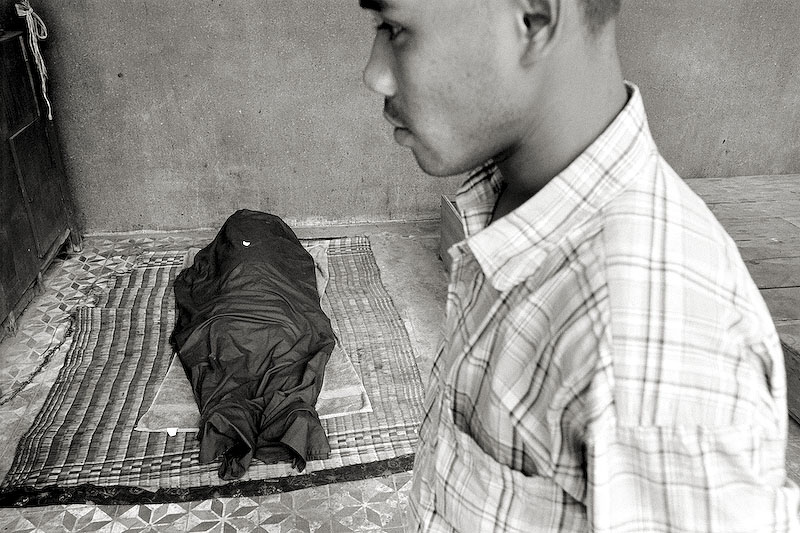 It
took the pair another day to rustle up enough friends, and cash, for the
cremation. Chan was tucked into a simple wooden casket. Then, cloth tied around
their faces because of the stench, six of them hefted the stiff, blanket-wrapped
body of Chan into the flames.
It
took the pair another day to rustle up enough friends, and cash, for the
cremation. Chan was tucked into a simple wooden casket. Then, cloth tied around
their faces because of the stench, six of them hefted the stiff, blanket-wrapped
body of Chan into the flames.
Perhaps 20 minutes passed from prayers to funeral pyre.
Each had the exact same thought: “Man, it could be me in
that box.”
Indeed, all of them – and more than 150 homeboys from across the United States - hang by a thin rope in Cambodia. Arms and chests covered in tattoos, they wear baggy clothes, ride massive motorbikes and hang in local hip-hop clubs, comprising an unique subculture that could be the strangest sidebar to America’s war on terrorism.
Locals call them DJs, a reference to
their loud rap music, hood-heavy slang, entire gangsta persona.
America classifies them
as deportees, excess baggage jettisoned in the anti-immigration fervor of
Homeland Security. They are shipped to their ancestral land in expulsions
derided by human rights advocates, without consideration of age, mental state or
family situation. Few read, and many cannot speak Cambodian. With a history of
mental problems, Chan, nicknamed Rascal, became the first suicide in early
December.
The approach of Christmas, alone in the land he escaped as a
child, wasn’t the only spur to his mounting anxiety. Friends say Chan had been
delving deeper into drugs, mainly a local version of met-amphetamine. His week
began with a beating in a brawl on notorious Street 51, a stretch of hostess
bars and discos that Chan’s crowd calls “the Strip.” Bruised and
despondent over the prospect of never again seeing the teen-age son he left
behind in southern California, he wrote a short note to his mother: “You
won’t have to worry about me ever again,” he promised.
Then, a few days after his first birthday in Cambodia since
she carried him to supposed safety a quarter-century ago, he hung himself.
Many feel America provided the rope.
“He was a sweet, gentle, fragile guy,” laments Holly Bradford, a clinical psychologist from Boston who runs Korsang, a Cambodian needle-exchange program that employed Chan and two dozen other deportees from America. “But he had serious problems, mental issues,” she adds. “Sending him here was a death sentence.”
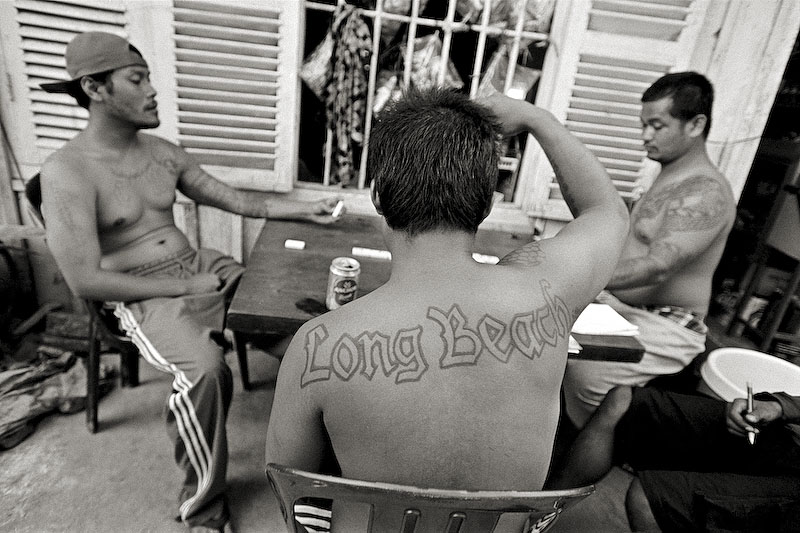 “This is the only place
in the world where you have this situation,” notes Bill Herod, an American aid
worker in Cambodia who has been helping with resettlement since the first
deportees arrived. “What’s goofy is these are people who grew up in the
United States. By any measure of common sense or fairness they are Americans and
don’t belong here.”
“This is the only place
in the world where you have this situation,” notes Bill Herod, an American aid
worker in Cambodia who has been helping with resettlement since the first
deportees arrived. “What’s goofy is these are people who grew up in the
United States. By any measure of common sense or fairness they are Americans and
don’t belong here.”
Thus far, 170 men – and one woman - have been expelled to
Cambodia thanks to harsh new laws enacted in 1996, designed to clear courts,
prisons and holding cells of illegal immigrants and foreign criminals. Gone was
individual consideration of specific cases, and any leniency.
Another 1,500 could yet face the same fate. They include
those who committed crimes as juveniles, served their time and moved on. A Texas
construction worker was deported to Cambodia for public urination. “Don’t
Pee in Public,” ran one headline about his case. Others expelled include a
79-year-old man and many with mental illness.
One man at Chan’s funeral says he isn’t Cambodian, but
Laotian. Human Rights Watch highlighted his plight in the recent report,
“Forced Apart.” His parents were among countless tribal people displaced as
the American conflict in Vietnam spread into Laos and Cambodia decades ago. The
timing of his birth, in Cambodia, on the run, sealed his future fate.
Bunreas Pin, or Boomer, a
rapper from Stockton, California, can muster no recollection of his new home.
Until being flown here in chains, he spent his whole life in America – except
three months as a toddler in a Thai refugee camp. “It was a total, total
shock,” he says of his first glimpse of Cambodia. His exodus inspired his
recent rap album: “Straight Refugeez.” The refrain of the title song sums up
their status: “we’re America’s nightmare.”
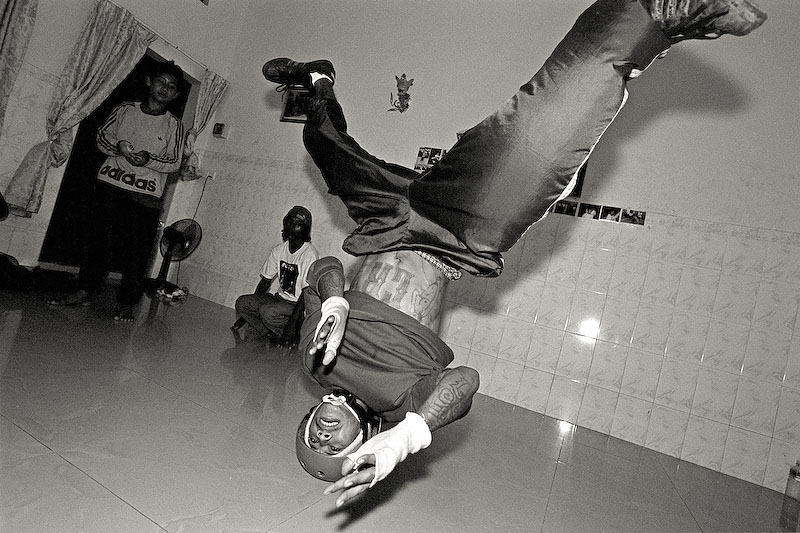 Like most deportees, Boomer was a gang member in the USA. All
were criminals. Many served their prison time only to find, because of tough new
American immigration rules, retroactively applied to long-ago misdeeds, there
would be no chance of parole or rehabilitation – ever.
Like most deportees, Boomer was a gang member in the USA. All
were criminals. Many served their prison time only to find, because of tough new
American immigration rules, retroactively applied to long-ago misdeeds, there
would be no chance of parole or rehabilitation – ever.
Instead, they find themselves sentenced to life, in Cambodia.
“It’s like you do the time, and then do it all over
again,” says Boomer, who readily concedes his mistakes - spraying graffiti,
running with a bad crowd, keeping guns. All this was while he was a teen. “I
was just a kid,” he notes. After two years in jail, “I figured I’d get out
and start all over.” Instead, like the rest, he ponders his penance daily.
“I felt like I was tricked,” adds Dicer, who grew up in
Utah, Texas and California. Deportation wasn’t even a possibility when he went
to court. “This is like a cruel and unusual punishment,” he says after four
years in Cambodia. “America is home. We don’t belong here.”
There certainly is no warm welcome at the airport in Phnom
Penh, where groups of 10-12 men arrive periodically, but unpredictably. Shackled
on the flight, they are turned over to Cambodian authorities – essentially
dumped cold turkey in one of the world’s poorest and most corrupt countries.
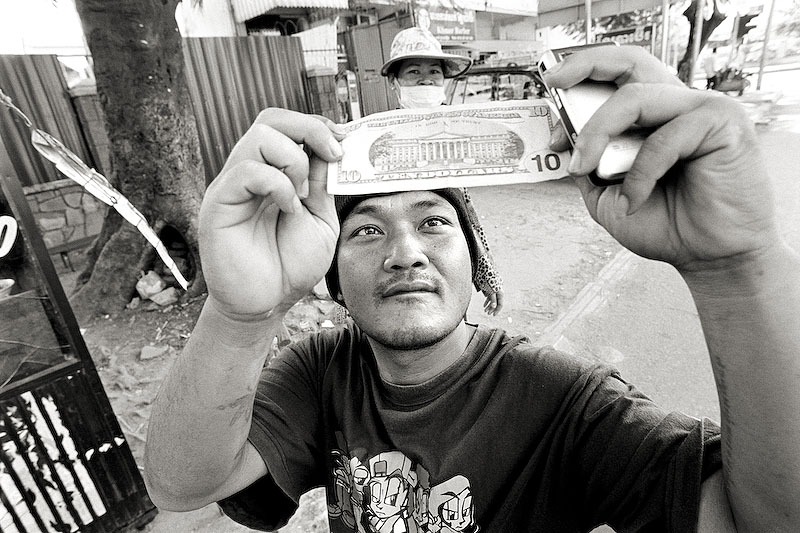 “They are generally scared, in shock,” says Herod, who
has been meeting the deportees since March 2002. As the first group was in the
air, attorneys fighting the deportations in America called for help. He promised
to meet them. “There was no program in place, no plan for resettlement,
nothing.”
“They are generally scared, in shock,” says Herod, who
has been meeting the deportees since March 2002. As the first group was in the
air, attorneys fighting the deportations in America called for help. He promised
to meet them. “There was no program in place, no plan for resettlement,
nothing.”
Deportees say they were greeted by guards who shook them down
for “entry fees.” Intimidated, alone in a land they knew only from
nightmarish tales of relatives, some were coerced out of hundreds of dollars.
Herod began knocking on doors, begging resettlement funding.
As an American in Cambodia since 1994, Herod saw this as one more wrong on a
very long list. A conscientious objector during the US war in Vietnam, he has
been involved Southeast Asian charities ever since.
He patched together a program to sponsor new arrivals,
provide supplies and transitional housing for the needy. “It was very
basic,” he concedes. “At the beginning we worked out of a guesthouse. A guy
would arrive with a serious drug problem, and there was nothing we could do but
lock him in a room with a TV and say, ‘Just Say No’.”
As the number of deportees increased, so did news coverage,
prompting American aide. “They were shamed into it,” says one deportee. A
three-year grant of $800,000 was announced in September 2005, by USAID that led
to the launch of the Returnee Integration Support Program (RISP).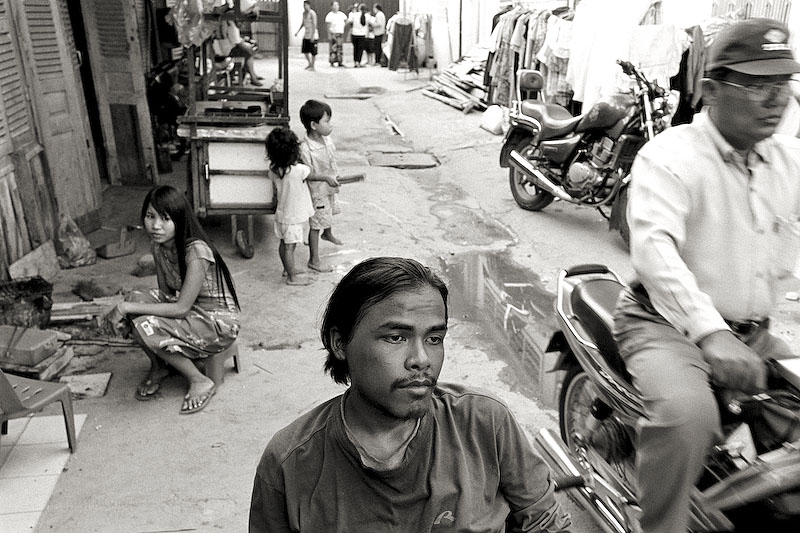
A community center for the deportees was established, with
computer training and job placement help. George Ellis, an American psychologist
who worked in Kosovo and Guatemala, began counseling in October 2005. Besides a
transitional facility offering three-month stays, there was another house for
those with special needs, like mental problems.
“There basically are no services for the mentally ill in
Cambodia,” Ellis explained soon after he arrived in Cambodia. The entire
country has only a dozen beds, and a couple mental health workers. Ellis had his
hands full. “Basically, all these guys are traumatized. Or doubly traumatized.
“Just getting to America involved all kinds of trauma for
them. Then, they are told the place they live isn’t where they belong,” he
adds. “They are not only deported, they are told they can never come back,
that they aren’t American. It’s a terrible, terrible blow to them.”
The Statue of Liberty and pledge to welcome the world’s
downtrodden to the contrary, America is in a rage nowadays over immigration.
Rhetoric is on the rise, compassion at a low. Many talk of erecting a giant
fence around the border, and not just extremists, even presidential candidates.
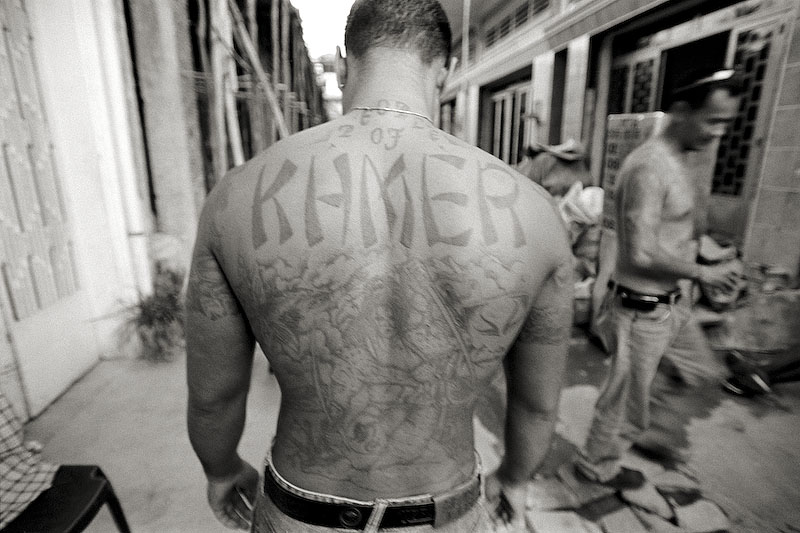 “This is a cyclical thing in US history,” says Rachel
Rosenbaum, a lawyer specializing in deportation issues at the Center for Human
Rights and International Justice at Boston College. “Look back a century or
more, and immigrants have repeatedly been the scapegoat.”
“This is a cyclical thing in US history,” says Rachel
Rosenbaum, a lawyer specializing in deportation issues at the Center for Human
Rights and International Justice at Boston College. “Look back a century or
more, and immigrants have repeatedly been the scapegoat.”
Cambodian refugees, she says, got caught up in reforms dating
to 1996, when new laws targeted hundreds of thousands of illegal immigrants
mired in the US criminal system. To speed deportations, the new codes removed
appeals, hearings, reconsideration. Basically, any foreign national in jail for
a felony, or convicted of one, could be deported quickly.
The Cambodians presented a quandary for a variety of reasons.
First off, they weren’t illegal immigrants at all, but refugees invited to
America. A bit over 200,000 people of Cambodian ethnicity reside in the US,
according to a recent census. An estimated three-fourths came after the US
bombing campaign and fall of Cambodia to the Khmer Rouge in 1975, according to a
study by Bill Ong Hing, professor of law and Asian American studies at the
University of California, Davis (near the state capital of Sacramento).
Secondly, most came as stateless refugees. International law
may oblige countries to accept repatriation of their nationals, but Cambodians
– along with Laotians and Vietnamese – comprise an enormous exception,
granted asylum, and permanent residency in the US. However America redefines the notion of “permanent,”
special agreements were needed to legitimize the deportations, including
approval from Cambodia.
Extreme pressure was applied to Cambodia to sign the deal,
says Roland Eng, who was Cambodia’s ambassador to Washington, DC, when a deal
was pushed in 2002 over his objections. “I was totally opposed to this. The US
told us that there would be no more visas issued, and our kids couldn’t go to
school in America. They forced the deal on us.”
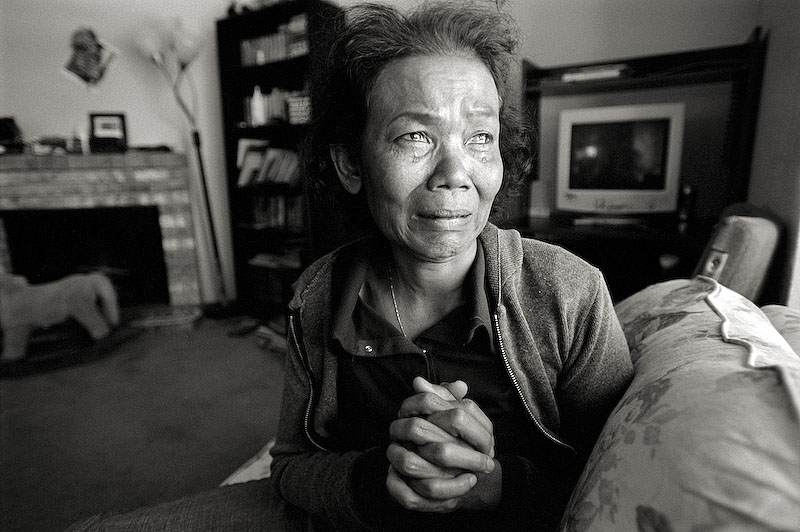 Many see it as yet another low-point in US foreign policy,
all the more shameful considering America’s role in the strife that made them
refugees. “This is a worse than just a failure of US refugee policy,” notes
Herod. “To just ship all these gang members here, to a country ill-equipped to
handle them. I worry the US is creating real long-term problems for Cambodia,
not to mention failing these guys it took in in the first place.”
Many see it as yet another low-point in US foreign policy,
all the more shameful considering America’s role in the strife that made them
refugees. “This is a worse than just a failure of US refugee policy,” notes
Herod. “To just ship all these gang members here, to a country ill-equipped to
handle them. I worry the US is creating real long-term problems for Cambodia,
not to mention failing these guys it took in in the first place.”
Bradford concurs: “Some of these guys are bad to the bone,
and not likely to change. But they were kids when they went to America. Cambodia
didn’t create these guys, or their problems, America did.
US officials in Cambodia declined to discuss the
deportations, saying it was an immigration matter. However, one senior US
official confided: “It’s morally reprehensible.”
Laos and Vietnam have still refused the deportations.
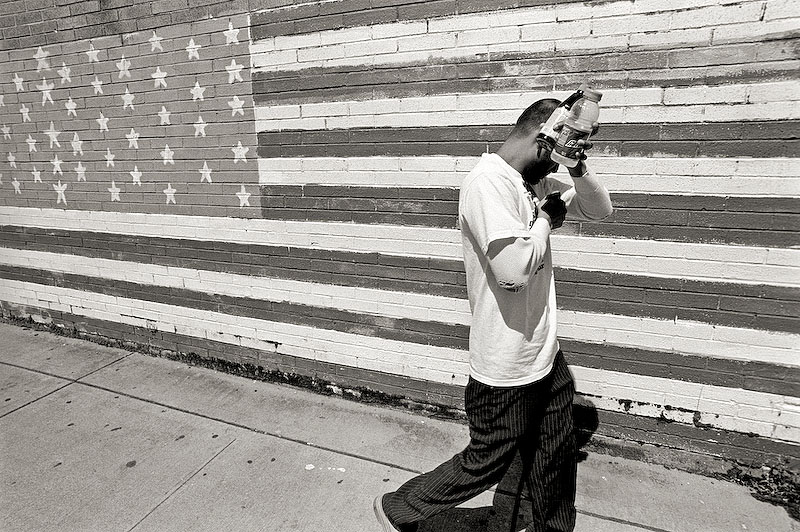 “Mainly, we would like to restore judicial discretion,”
says Rosenbaum. “The lack of discretion is really un-American,” she notes.
“No other area of law could be like this. It’s basically one strike and
you’re out.”
“Mainly, we would like to restore judicial discretion,”
says Rosenbaum. “The lack of discretion is really un-American,” she notes.
“No other area of law could be like this. It’s basically one strike and
you’re out.”
Change, she said, would have to come not through court, but
legislation. Yet, no sane politician would champion this issue in the current
climate. And victims of this alleged injustice hardly inspire empathy with their
tough language, gang tattoos and history of crime.
“There is no poster boy for this cause,” concedes Many
Uch, a Seattle man who has been filling the role, however reluctantly since late
2006, when a documentary featured his case and that of two others facing
deportation. Since then, Uch has been speaking to schools and community groups.
With his calm, measured speech, few would guess at his felonious past.
Born during the reign of the Khmer Rouge – he turned 32 in
January – he never knew his father. Separated in the chaos of the Vietnamese
invasion in 1979, his mother fled to a Thai refugee camp. Arriving in American
in 1984, his was an all-too typical immigrant upbringing: single parent baffled
by the new culture; grim public housing; gang membership.
“When I was 18, I got involved in a robbery. I was the
driver and there were guns in the car.” Rather than risk testifying against
friends, he pled guilty. That was his lawyer’s advice – terrible as it
turned out. But it was 1994, and the deportations hadn’t been dreamed up.
Sentenced to 55 months in jail, Uch served 40. Instead of
release, he was sent straight to an immigration detention facility. The 1996
laws had taken hold. Once a permanent resident, he was now unwelcome. Anywhere.
What followed was a legal limbo. “Some guys get stuck in
immigration for 5-10 years,”
notes deportee Dicer, who spent four year in such confinement, which he called
worse than prison. “You had no rights.”
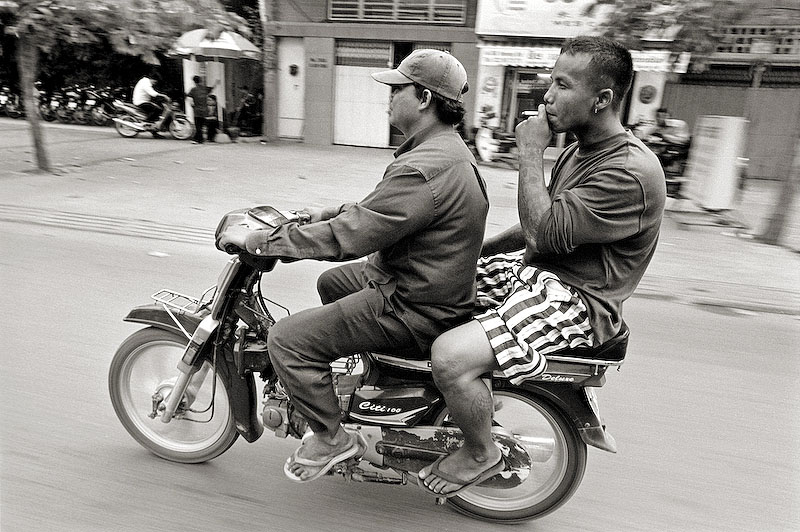 Uch decided to fight. Pouring over legal texts in the
detention center library, he began filing motions, and urged others to join the
legal battle. “I figured, if enough of us filed, it would be so expensive,
they’d have to do something, like give us a hearing.”
Uch decided to fight. Pouring over legal texts in the
detention center library, he began filing motions, and urged others to join the
legal battle. “I figured, if enough of us filed, it would be so expensive,
they’d have to do something, like give us a hearing.”
Instead, he elicited the attention of Jay Stansell, a Seattle
public defender who fought all the way to the American Supreme Court. Stansell
offered an early echo of Guantanamo Bay - holding people indefinitely was cruel
and unusual punishment. He won, and thousands were released.
Then, Cambodia signed the deportation deal. Kim Ho Ma and
Loeun Lun, featured in the documentary with Uch, have both been banished. Uch
tries to live day to day, a pressure that contributed to the breakup of his
recent engagement. “You cannot plan for the future,” he says.
Nearly six years have passed since the first child refugees
were sent back to Cambodia. Some hit the ground running, picked up by family
members, and make a new life. Perhaps 10-20 percent, says the counselor Ellis.
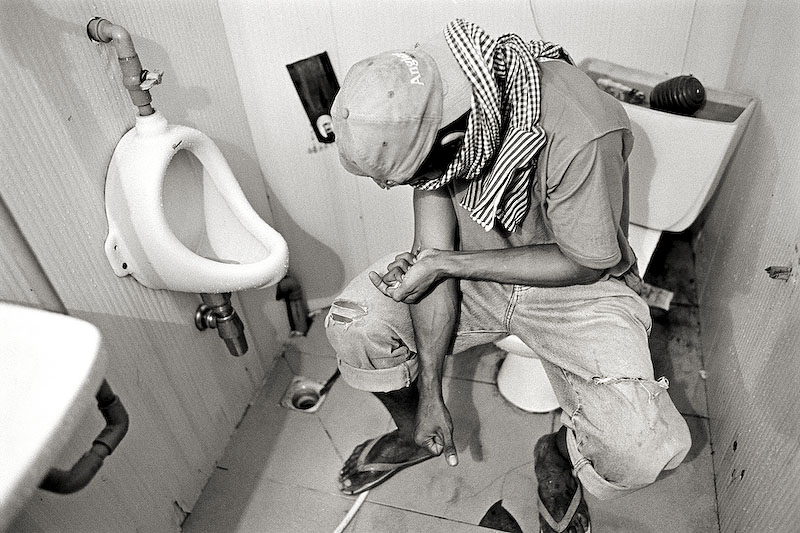 Another 30 percent struggle to get by. Most go through a wild
phase upon arrival, hitting the clubs and partying hard. Drugs are cheap and
plentiful in Cambodia. “Chicks love us,” notes Boomer. For guys who have
spent years locked up, freedom in Cambodia can be a real high.
Another 30 percent struggle to get by. Most go through a wild
phase upon arrival, hitting the clubs and partying hard. Drugs are cheap and
plentiful in Cambodia. “Chicks love us,” notes Boomer. For guys who have
spent years locked up, freedom in Cambodia can be a real high.
Then comes the crash. “Oh yeah, that’s the traumatized
stage,” Boomer says. “Everyone goes through it. A lot of guys stall, think
things will change and this will be over. But you have to accept it and get
on.”
Many never come to terms with the new reality, or fall
through the cracks, just as they did in the US. Even a decade or more after
arriving in the US, Cambodian immigrants made significantly less money than the
national norm or other Asian immigrants, according to Professor Hing. The
reasons aren’t entirely clear, but they tended to be poorer and less skilled.
Plus, they were fleeing perhaps the worst genocide the world
has seen. An October 2006 study in American Journal of Public Health noted
astronomically high rates of depression and Post-Trauma Syndrome among former
Cambodian refugees, even decades on.
How many deportees suffer from the same symptoms is
anyone’s guess. Ellis won’t be making any assessment. He left Cambodia last
year after the US abruptly ended funding for resettlement, a year earlier than
promised.
“We had to cut staff drastically, and close the
transitional house,” says Sonec Tan, who worked for RISP and stayed on with a
program run by deportees like himself. Among those tossed out on the street when
the transitional house closed was Ver Chan.
Tan shows me around the small shelter in a bad part of Phnom
Penh, all they can afford on a budget of $4,000 per month. In the backyard is a
shack made of scrap wood, home of Cowboy, who Tan says belongs in a mental ward.
“If we closed this place down, he’d be dead.”
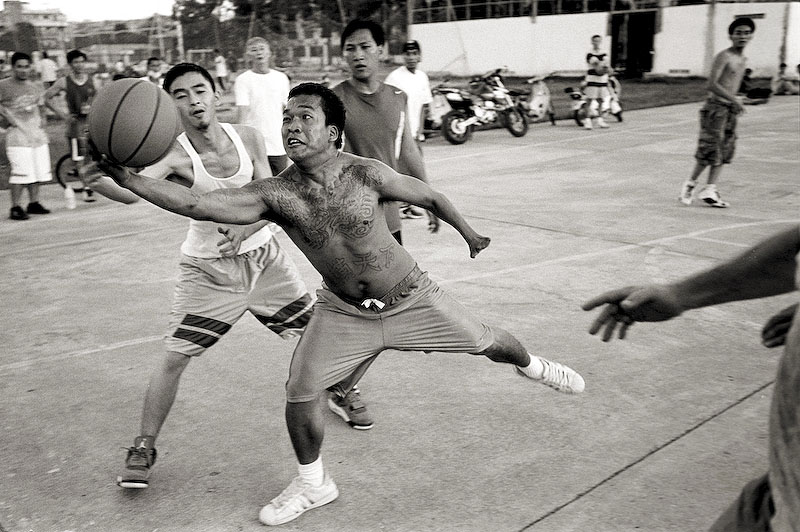 Yet, the irony is, deportees admit, being here may have saved
their lives. “If I was back in the US, I’d either be in jail or dead,”
says Boomer.
Yet, the irony is, deportees admit, being here may have saved
their lives. “If I was back in the US, I’d either be in jail or dead,”
says Boomer.
“This is like a new chance,” explains Sarath Vong, who
goes by the name of Boney. Chan, his cousin, he says, "was getting deep into
drugs." Coming to Cambodia, he says, gives guys a chance to start fresh.
"You
gotta move on. It’s like playing cards. You just cannot keep playing the same
cards. You gotta change.”
Leaving the gangs – and gang violence – in the USA, he says, was the best break that ever happened to him. Now, 38, he has a job for the first time in his life. Also a new wife, marrying a local girl a few months ago.
Dicer, 40,
did the same. His family from the US flew to Cambodia to make all the
arrangments. “They wanted me to settle in,” he says. "They know it will
be good for me."
Yet such advances aside, every single one of them – Boomer, Boney, Dicer – would trade it all for what they had and lost, what was promised, then taken away. “If I could go back?” Boney says, “In a minute! America is home.”
Ron Gluckman is an American reporter who has been living in and covering Asia since 1991. Since 2005, he has been dividing his time between Bangkok and Phnom Penh, where he immediately noticed an odd group of guys filling the local basketball court - baggy pants and hot-dog style suggesting typical Americans, but their stories anything but. He spent several years following this story, finally printing this story in Macau's Closer magazine in March 2008.
All pictures courtesy of Stuart Isett (©2008 Stuart Isett), who has extensively documented this subject, and has shown his collected work in many shows. See more of his photography at http://isett.com
To return to the opening page and index

push here
[right.htm]